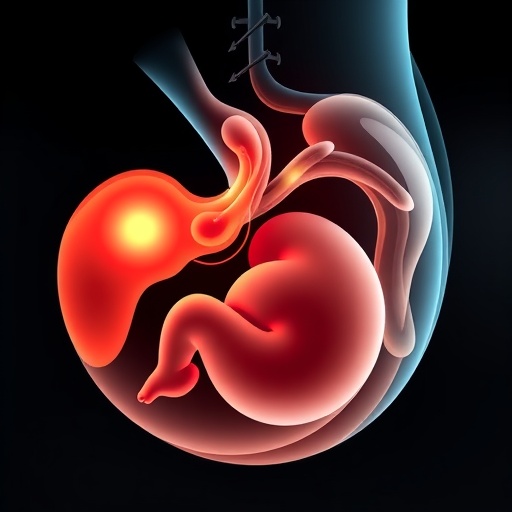In a groundbreaking study conducted by Lucaccioni and colleagues, the intricate dynamics of extrauterine growth restriction (EUGR) have been brought into sharp focus, revealing its profound impacts on postnatal growth, particularly in very low birth weight preterm newborns. As neonatal care continuously evolves, understanding the subtle yet detrimental consequences of EUGR has become increasingly paramount for clinicians aiming to enhance the long-term health outcomes of these vulnerable infants. The researchers meticulously analyzed data from a cohort that highlights the pervasive challenges associated with inadequate growth during the critical early stages of life outside the womb.
Through this research, the scientists illustrate that EUGR is more than just a transient issue; it poses long-lasting effects on the physical and cognitive development of preterm infants. These findings are underpinned by the notion that extrauterine environments often lack the optimal conditions necessary for a newborn’s growth. As babies transition from the womb—a place where they receive nurturance and essential nutrients—to the external environment, discrepancies in growth trajectories emerge, signaling the need for immediate intervention and support.
EUGR is characterized by growth deficits that often manifest as inadequate weight gain during the neonatal period. The study reveals a correlation between the degree of restriction experienced in utero and the challenges faced postnatally. Preterm infants, who are typically born before the 28th week of gestation, are particularly susceptible to these growth challenges, as they may face various physiological hurdles that inhibit healthy growth. Lucaccioni et al. make a compelling case that addressing EUGR can significantly alter the developmental benchmarks of preterm infants, improving their chances for thriving in the years to come.
One crucial aspect highlighted in the article is the interplay between nutrition and growth after birth. Inadequate caloric intake, nutrient deficiencies, and interruptions in feeding regimes are critical factors that exacerbate the effects of EUGR on preterm infants. The investigation emphasizes the importance of a tailored nutritional approach—often guided by recent advancements in neonatal nutrition science—that addresses both the caloric and qualitative needs of these infants. Clinicians are encouraged to adopt an interdisciplinary strategy incorporating dietitians, lactation consultants, and pediatricians to optimize nutrition for vulnerable newborns.
The study also takes into account the role of environmental factors in postnatal growth. For instance, the conditions of neonatal intensive care units (NICUs) play a pivotal role in either alleviating or exacerbating growth restrictions. Factors such as noise, light exposure, and the overall atmosphere within the NICU can profoundly affect a neonate’s growth trajectory. Lucaccioni and the team suggest implementing environment modifications in these units to promote a more womb-like experience for preterm infants, which could mitigate the incidence of EUGR and improve postnatal outcomes.
In addition to the immediate risks associated with EUGR, the research underscores potential long-term health consequences. Preterm infants who experience EUGR may face challenges in cognitive development, physical growth patterns, and increased susceptibility to chronic health conditions later in life. Lucaccioni et al. advocate for a proactive approach, wherein healthcare providers monitor growth parameters intensively and implement immediate interventions to foster healthy development. Early identification of infants at risk of EUGR, followed by tailored management plans, could become standard practice within neonatal care frameworks.
Adding depth to their findings, the authors employ rigorous statistical analyses to correlate EUGR with various postnatal growth metrics. These analyses substantiate the argument that timely interventions can lead to significant improvements in growth trajectories among affected infants. Their results highlight the potential for early intervention programs to serve as game-changers for preterm infants facing growth restrictions compared to those receiving delayed support.
These insights into EUGR contribute to the growing discourse surrounding neonatal care, emphasizing the need for increased awareness and understanding among healthcare professionals. As the medical community strives to enhance outcomes for preterm infants, the research encourages ongoing discussions regarding best practices for addressing the health determinants that influence growth and development in this population. By fostering a continuum of care that facilitates optimal growth conditions, stakeholders promote the well-being of preterm infants as they navigate their critical growth phases.
While the findings are significant, the authors acknowledge the complexity of EUGR and its multifactorial nature. Genetics, maternal health status, and socio-economic factors intertwine with biological determinants to influence the growth of preterm infants. As such, the comprehensive management of EUGR must consider these diverse influences to create effective, individualized care plans. Lucaccioni et al. advocate for collaborative studies that encompass multi-disciplinary perspectives, laying the groundwork for future research avenues aimed at reducing EUGR incidence.
In conclusion, the study led by Lucaccioni and colleagues not only sheds light on the urgent challenges of extrauterine growth restriction but also paves the way for enhanced neonatal practices that prioritize the health of very low birth weight preterm newborns. As research evolves and our understanding deepens, strategies informed by these findings hold the power to transform neonatal care and improve lifelong outcomes for the most vulnerable infants.
The ongoing examination of EUGR and its implications reinforces the significance of evidence-based practices in the realm of neonatal health. By consolidating the voice of researchers, clinicians, and caregivers, we can collectively drive progress and innovation in the fight against the adverse effects of EUGR in preterm infants. As we embrace this knowledge, we establish a foundation for the future, one where every newborn, regardless of their birth circumstances, has the opportunity to flourish.
Subject of Research: Extrauterine growth restriction and its impact on postnatal growth in very low birth weight preterm newborns.
Article Title: The burden of extra uterine growth restriction on postnatal growth in very low birth weight preterm newborns.
Article References: Lucaccioni, L., Pietrella, E., Malmusi, G. et al. The burden of extra uterine growth restriction on postnatal growth in very low birth weight preterm newborns. BMC Pediatr 25, 965 (2025). https://doi.org/10.1186/s12887-025-06326-9
Image Credits: AI Generated
DOI: https://doi.org/10.1186/s12887-025-06326-9
Keywords: Extrauterine growth restriction, very low birth weight, preterm newborns, neonatal care, postnatal growth, nutrition, health outcomes.




